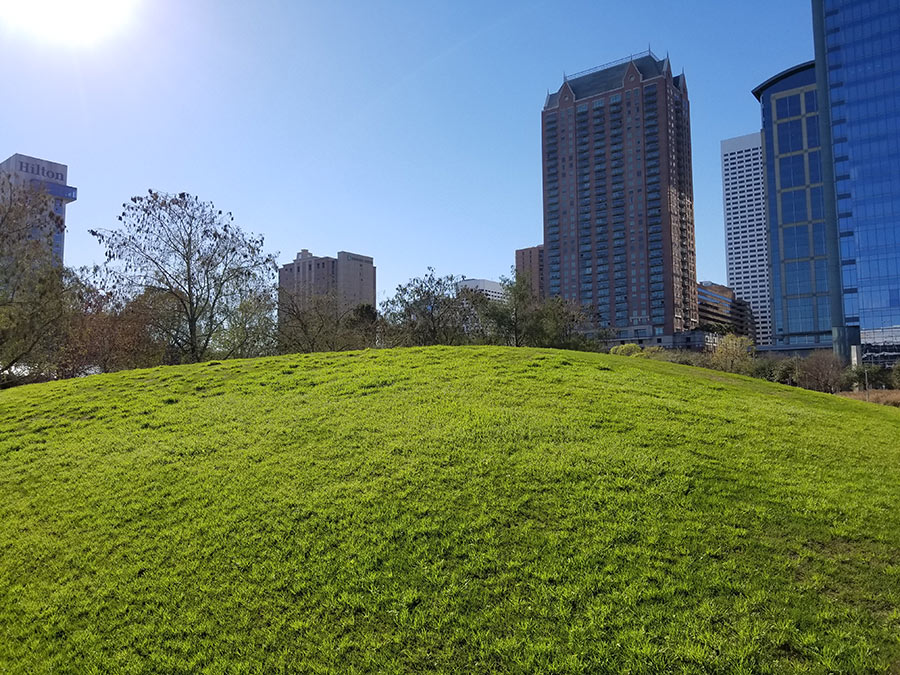
- LaSalle Investment Management Has Backed Out of $450M Bid To Buy 1000 Main Tower Downtown, According to Real Estate Alert [Houston Business Journal]
- How a Small Change in Texas’s Property Tax Code Helped Corporations Avoid Paying Millions in Property Taxes [Texas Observer]
- HISD To Vote Today on Using Eminent Domain Powers on Westbury Manor Apartments To Expand Adjacent Westbury HSÂ [Houston Chronicle]
- 45K-SF World Gym Opening in About a Week in the Redeveloped Macy’s Building at Mall of the Mainland [Galveston County Daily News ($)]
- Berryhill Baja Grill on Montrose Blvd. Has Closed [Food Chronicles]
- 3-Story Lounge Henke & Pillot, Named After Grocery Chain, Planned for Former ERA Spot at 809 Congress [Eater Houston]
- City Overcharged 241,000 Water Customers by a Total of $24.9M [abc13]
- How Houston’s Required 25-Ft. Setback from Major Thoroughfares Has Uglified It [Purple City]
- Nassau Bay To Replace All 234 City Street Lights with Solar Fixtures This Spring [Click2Houston]
Photo of Sesquicentennial Park: Russell Hancock via Swamplot Flickr Pool
Headlines





Re: Equal & Uniform Property Taxes: Its certainly true that ARBs and juries and even judges and legislators have a poor understanding of the implications of the uniform and equal clauses. Its true that they are frequently misapplied and that this is taken advantage of by consultants and attorneys. It is also true that the more sophisticated counties, including Harris County and perhaps especially Harris County, have become adept at using circular math to sell their side of the story — also on not entirely logical or ethical grounds. You can use their formulas to adjust a chicken coop to an office building, and although that demonstrates the internal consistency of their model, it fails to demonstrate that the dozens of variables that go into a valuation are appropriately accounted for. The issue is so complicated and confusing that most property owners and even their hired guns cannot make the argument and that those tasked with deciding the issue cannot decide it.
The biggest issues that needs to be addressed in my opinion are that it only makes practical sense to make a judicial appeal if somebody owns a high-value property, and also that high-value and commercial appeals tend to be made more frequently and are also more successful for a variety of reasons. Some states apply different millage rates for residential and commercial properties and that strikes me as appropriate. A slightly progressive property taxation scheme might in general tend to be more equitable and more in line with the spirit of the state constitution.
I think that theNiche has hit on such a solid point in the first part of his comment. Especially with the refineries in question, there are so few and each are so different that they are not just hard for the ARB, judges and juries to value, but also the expert appraisers that either side hires to defend their numbers.
I do have to side with harris county appraisal district though when it comes to high rise office buildings. before this 1000 Main sale fell through it would have been the peak of the last two years of commercial property values skyrocketing, and yet the district has to struggle each year to defend values 3/4s of what these skyscrapers sell for. In 2013 33 out of 34 high rise offices in downtown houston sued to have their values lowered. in 2014 all 34 sued. can they all really be above the median?
Somebody help me understand why it makes more practical sense to make an appeal for high-value property vs. residential and why commercial /high-value property appeals are much more successful. Is it just an issue of deeper pockets and the money one stands to gain in contrast to money spent on litigation?
If large industrial property owners are constantly playing games with their taxes in court, it goes a long way to explain the new fees that a lot of cities are charging. Repairs to roads and drainage SHOULD come out of the general fund, but if the general fund is starved by companies like Valero and their lawyers, of course he City’s going to look for alternate ways to pay for these things. Ergo Houston’s drainage fee.
.
And it won’t stop there. Why not have a “heavy infrastructure fee” of a few cents on every truck over a certain tonnage that enters or exits a plant? This could fund desperately needed road repairs out in the Eagle Ford – without relying on assessments that are pushed down in court. Or a visual blight fee, a fee on smoke stacks, flairs, or other industrial equipment that extends more than a certain height off the ground? Use the money to pay for city parks and beautification – to get around the assessments…. You see where I’m going with this.
I.P: Protesting costs $ in the form of time.
If you have a $100k tax value home that’ you’d like to protest down to $80k, what are the savings to you if you win? Thus what can you spent to make it worth fighting?
If you have a $100m tax value property, protesting it down to $80m is a giant savings in taxes, thus you can spend a lot more to fight it (and thus, are more likely to succeed)
.
I still contend a “solution” would be to force hcad to buy your property for x% (say, 10%) under their claimed tax value. So if they go unfairly high, they have to buy it (thus put their money where their mouth is. And if they truly think it’s worth $y, and they get it for $y -x%, then they should be able to sell it for a profit, right?
.
On the flip side, many people protest their tax values even though they KNOW it’s already under market. So in that case, if you protest, someone should be able to buy your property for the appraised value PLUS %x (say, 25%). After all, that’s still 25% over what you just protested that it was worth, so it’s a good deal for the owner, right? Unless they were not protesting in good faith.
@ ZAW: A few things come to mind:
The City could also raise cash by raising its property tax rate, but no mayor or council member wants to be on record for doing so, and there’s a popular perception that taxes flowing to the general fund get raided for inappropriate staff raises, bureaucratic inefficiency, etc. It just sounds better to most voters to have a fee that has some nexus between the reason it’s levied and a supposed dedicated fund for mitigating that issue. Not to mention, the General Fund’s financial position really isn’t very good to begin with, especially with pressure from employee pension obligations.
@ I.P.F.: Large commercial property owners can afford to hire the best consultants (or even direct staff), who have the most expertise, to fight their appraisal battles for them. Your average homeowner has fewer such services available at a rate that’s reasonable for both the taxes at stake and the homeowner’s financial resources. Plus, for commercial properties, one can have multiple avenues for arguing the case for reduced valuation – income approach (such as stuck with under-market leases or high vacancy), special building condition or maintenance issues, the claim of inappropriate comparables being used by the appraiser – made all the easier because of the lack of required sale disclosure (while the public appraisers usually have access to MLS, one way or another, on the residential side).
@ Tall Texan: Imagine that you are protesting the value of your home and you have been scheduled toward the very end of the year and everybody in your neighborhood that was going to protest has already done so. Some of them have been successful, some of them haven’t. ARBs are notoriously inconsistent about how they arrive at their decisions. Because you’re going last, you get to craft your equity argument by cherrying-pick your “reasonable sample” of comparable properties from all of the most successfully protested houses in your neighborhood, which no longer adjust correctly to the HCAD valuation model if they were the result of ARB decisions. Okay, so good for you. You have an unfair advantage because you went last.
What if are the first person in your neighborhood to have their hearing? You can’t argue for a cut on the basis that other ARBs will probably make bad decisions on other properties in the near future, but its still unfair. What can you do to preserve this advantage? File a lawsuit against HCAD within 30 days of the ARB decision. Nobody will get around to your lawsuit for a very long time, and others may settle their cases in between when you filed your suit and when you’re about to go to trial. Very very few of these suits go to trial. Almost all get settled. But what the lawsuit does is it buys you time and gives you another bite at the apple. Of course, this strategy only works when you have a property that is valuable enough to have a high-enough tax bill that it warrants being constantly litigated.
So to answer your question, yes, it is conceivable that all 34 of the downtown highrises that you cite will end up being appraised above the appropriately adjusted median valuation. Even if that isn’t true in all cases, it still makes sense to litigate very nearly every single year.
@ I.P. Freely: In addition to the basic threshold for litigation that enough money has to be on the table to pay the lawyer, which ordinarily makes it uneconomic for most properties to litigate, there are other factors that favor high-value residences and commercial properties. 1) There are fewer of them and they tend to be somewhat unique. If you own a house in a subdivision of several hundred nearly-identical houses and 80% of your neighbors didn’t protest (because they aren’t very savvy), you’re going to have a tough time presenting your equity case. If you own a retail center of a certain size then you have the freedom to compare to other retail centers of a certain size, but there just aren’t very many of them and so you could compare to one that’s in a lesser neighborhood several miles away and that has a lower traffic count. The more unique your property, the more creative you can get. 2) All houses are valued on the cost approach to market value wherein the cost study calibrates depreciation rates to sales data from throughout the county; commercial properties might be valued on either a cost approach (with abysmally poor attempts at sales calibration) or an income approach. Income-basis arguments are much easier to make to ARBs and even to experienced HCAD staff. In a way, its yet another bite at the apple. 3) HCAD will refuse to acknowledge the possibility of inequity as a part of their models for improved property because doing so would undermine their internal consistency and make it harder to win the next protest or the lawsuits that come out of that tax year. The ARB usually goes right along with this and make it very difficult to win a case on equity. By contrast, the judicial process is such that equity is the basis for almost every argument that gets made, and since that is the last step in the process for each tax year, HCAD is more willing to settle on equity at that point. 4) Most residential properties and low-value commercial properties can file for arbitration if they can’t afford a lawsuit, but there’s a $500 fee that is required up front and that is refunded only if the property owner wins, and 99% of arbitrators won’t formally consider the equity argument. That’s how most arbitrators interpret the existing state law for arbitration.
@ Cody: Let’s not go giving HCAD a portfolio of real estate that they have to manage while attempting to dispossess it. They will not make competent landlords. Although cathartic, its bad policy.
@ LocalPlanner: According to case law, an particular building’s vacancy or loss(gains)-from-lease should NOT be considered as part of its income valuation for tax purposes. (Doing so infers an income tax.) A simple example is that if you have a vacant former K-Mart across a street from an occupied Walmart (of similar size and vintage), they should both be valued at the same level in accordance with prevailing market conditions. However, in fact, both appraisal districts and ARBs will tend to give consideration to the vacancy of a building such as the former K-Mart and will tend to be recalcitrant about giving the occupied Walmart a cut; and then, Walmart will swoop in and argue not only that their market value is too high, but also that their valuation should be equitable with the excessively-low-valued former K-Mart.
@Planner: the question is one of politics. It’s nearly impossible to get a new tax through, these days. So cities look for other ways to raise revenue. They impose fees on things like impervious cover, or any number of other things. Or they look for Payments in Lieu of Taxes (PILT) from tax exempt institutions. Of they impose hefty fines and use that money. These aren’t officially taxes, so it’s easier to get the votes for them to pass, but they pay for city services just like tax dollars.
.
There are two problems with it. First, It would be a lot simpler, and better, if big industrial and commercial property owners would buck up and pay their fair share of taxes. Second, it’s only a matter of time before passing new fees becomes as impossible as passing new taxes. People will realize these are taxes by a different name – many already have (the drainage fee was referred to by detractors as a “rain tax.”) – and they will vote accordingly..
.
Of course there’s a third option. Reduce the size of government; make it live within it’s means. Again the problem is politics. Are you going to tell a bunch of public school children that they’ll need to cram in 40 to a class? Are you going to break he promise of pension for public employees? Are you going to slash the local police force so much that it can no longer fight crime? If only big commercial and industrial property owners would pay their fair share of taxes – you wouldn’t have to do those things!
@ ZAW: Since you’d like to talk about things that require impossible legislative outcomes, here’s an alternative perspective about commercial property taxation: get rid of it altogether. Offset it a to a degree with new user fees on infrastructure, sure, but acknowledge that commerce is desirable and is the primary force that supports housing valuation and housing development.
Doing so would have the added benefit of making it just that much more incrementally difficult for taxing entities within Texas to compete against each other for which can offer the largest tax abatement deals. That would mean that it’s less an issue of Sugar Land versus Stafford and more an issue of Texas versus Louisiana, which is just as it should be.